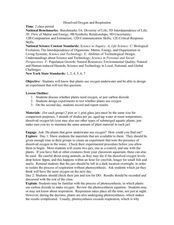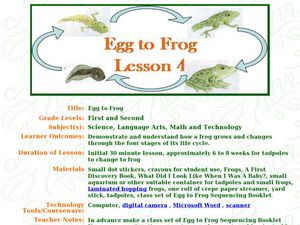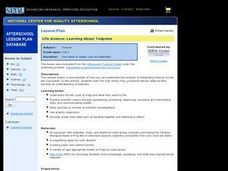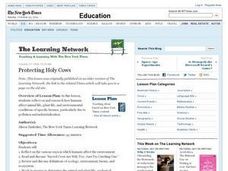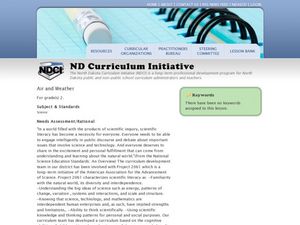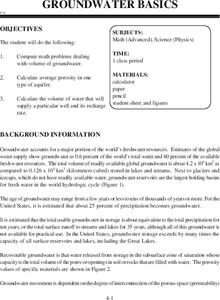Curated OER
Ride the Wild Leaf Cycle
Fourth graders explore plant life by completing an Internet activity. For this botany lesson, 4th graders identify the types of plants that grow locally and the different soils they utilize to survive. Students read assigned text about...
Curated OER
Dissolved Oxygen and Respiration
Students are presented with the question, "Do plants that grow underwater use oxygen?" They create an experiment to test the presence of dissolved oxygen in the water using provided materials. Student experiments include a control jar as...
Biology Junction
Cellular Respiration
Which food molecules must be present for cellular respiration to occur? Scholars view an informative presentation to better understand the process of cellular respiration. It details each step, focusing on the locations and the four main...
Illinois Department of Natural Resources
Section Two: Why is Biodiversity Important?
Explore soil, genetic traits, natural resources, and pollution in a series of lessons that focus on biodiversity. Kids complete experiments to learn more about the importance of varied genes and organisms in an ecosystem.
Brooklyn Children’s Museum
Volcanoes!
Give young geologists an up close and personal look at volcanoes with a series of hands-on earth science lessons. Whether they are investigating the properties of igneous rocks, building their own volcanoes, or making fudge to model the...
Mr. E. Science
Atmosphere
Earth's atmosphere is full of different energies, from thermal to wind to electromagnetic radiation. Through the presentation, class members discover these energies and how they determine weather patterns.
Read Works
We Need Freshwater
Why do we need freshwater? Because freshwater sustains life. After reading a three-paragraph passage about the importance of freshwater, first graders respond to the article by answering comprehension questions. The resource includes...
Rensselaer Polytechnic Institute
Molecules to the Max!—Teacher's Discovery Guide
Molecules to the Max! refers to a movie released in 2009 about the world of atoms and molecules. A helpful discovery guide provides five posters on science topics typically covered at the middle school level. It also explains the...
Curated OER
The Hudson's Ups and Downs
Fifth graders practice interpreting line graphs of the Hudson River water levels to assess the tides and tidal cycles in the estuary. They explore how weather can affect water levels and tides and observe that high tides and low tides...
Curated OER
Clouds
In this weather activity, students read a detailed information sheet about different kinds of clouds and what weather they bring. Students answer 12 questions
Curated OER
Egg to Frog
Students study the life cycle of the frog. In this life cycle lesson set, students listen to a read aloud of Frogs, A First Discovery Book, and make a sequencing booklet that shows the four stages of the frogs life cycle. They observe...
Curated OER
Life Science- Learning About Tadpoles
Students investigate a frog's life cycle. In this tadpole lesson plan, students observe tadpoles in an aquarium and record results. Students fill in a KWL chart as an assessment.
Curated OER
Wigglers, Tumblers, & Bloodsuckers
Young scholars explore the life stages of a mosquito. In this animal biology instructional activity, students read Why Mosquitoes Buzz in People's Ears by Verna Aardema and complete several activities including an experiment with...
Curated OER
To Drink or Not to Drink?
Second graders compare water conservation issues as they impact the past, present, and future in Nevada. For this water conservation lesson, 2nd graders perform and ice experiment to comprehend water collection differences. Students...
Curated OER
Recycled Paper Making
Second graders investigate the life of a recycled newspaper by experimenting in class. In this recycling lesson, 2nd graders create their own recycled paper pulp by mixing an old newspaper into a bucket and adding water. Students...
Curated OER
Watersheds: The San Francisco Bay Watershed
Sixth graders make a model of a watershed. For this geography lesson, 6th graders view a shaded relief map of California and locate landmarks. Students examine the San Francisco Bay Watershed by following the journey of water through the...
Curated OER
The Froggy Page
Students investigate the cycle of life by observing tadpoles. In this biology lesson, students utilize the Internet to read stories, observe pictures, and listen to sounds of frogs. Students create a poster board collage using frog...
Curated OER
Protecting Holy Cows
Students study the interrelationships of organisms and their environments. They study ecological communities and determine what is necessary for survival. Students discuss and answer questions concerning a group's biome, habitat, food...
Alabama Learning Exchange
Making and Observing Life in a Terrarium
Young scholars understand the parts of the terrarium and why they are important in establishing an ecosystem. In this ecosystem lesson, students recall background information on aquariums, terrariums and the water cycle. Young scholars...
Curated OER
Air and Weather
Second graders study Earth's materials. In this air and weather lesson plan, 2nd graders note changes in the weather and examine tools that help us study the weather. Students analyze how changes in the environment make changes in the...
Curated OER
Clouds
Second graders explore how to identify cloud types by observing clouds. They record data and have fun by applying newly acquired knowledge throughout the curriculum.
Curated OER
Marine & Aquatic Habitats -- Journey of a Drop of Water Through a Watershed
Students discuss pollution and the steps in the hydrologic cycle. They follow a drop of water through a watershed simulation. They discover the components of a water cleaning system as well.
Curated OER
Climate Change-Boon or Bust for Northern Waters?
Students explore about and evaluate the potential impacts of climate change on northern hydrological systems. They work in small groups, research the background to climate change in the north with a particular focus on lakes and rivers.
Curated OER
Groundwater Basics
Groundwater is an essential natural resource, not to mention a fascinating topic to study. Here is a series of twelve amazing lessons on the water source and how we use it in our daily lives. Concepts require higher math and physics...
Other popular searches
- Water Cycle Diagram
- The Water Cycle
- Water Cycle Experiment
- Water Cycle Activities
- Water Cycle Stages
- Water Cycle Crossword
- Water Cycle Lesson Plans
- Water Cycle Reader's Theater
- Water Cycle and Evaporation
- Water Cycle Diagram Label
- Water Cycle Simulation
- Build Your Own Water Cycle



